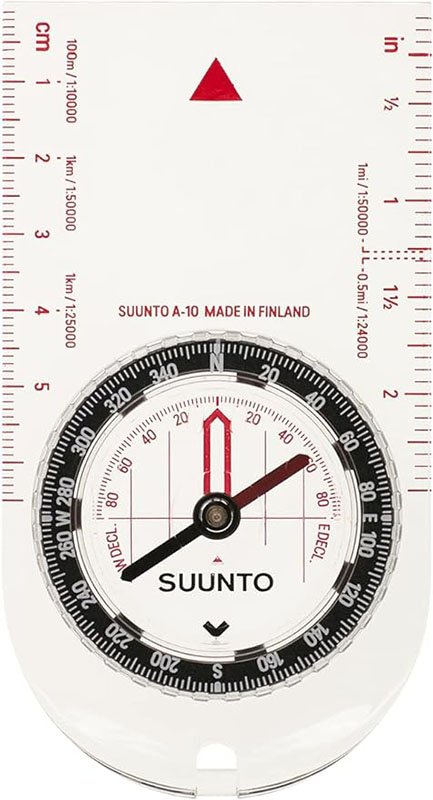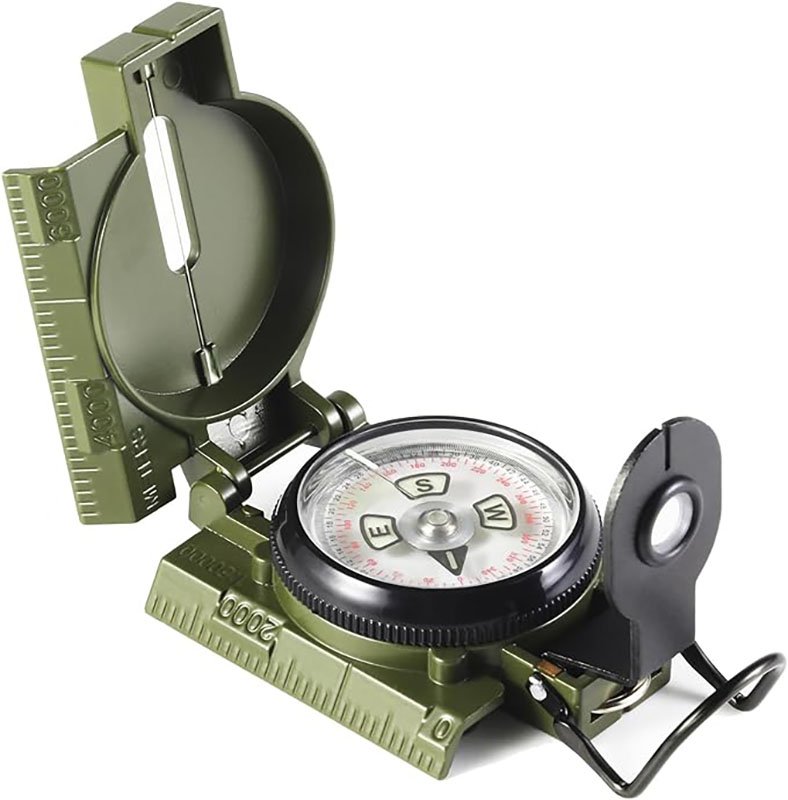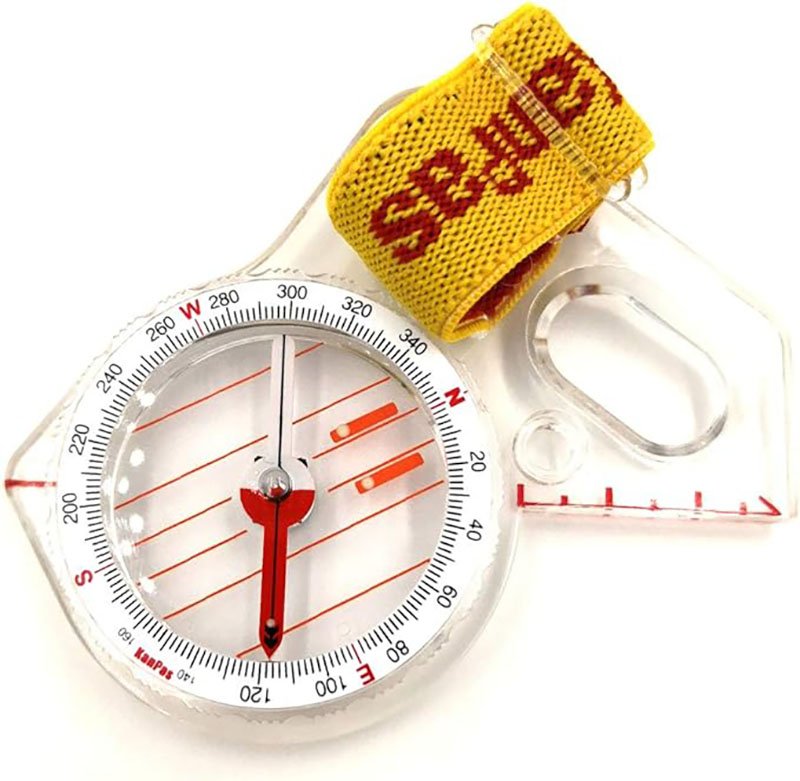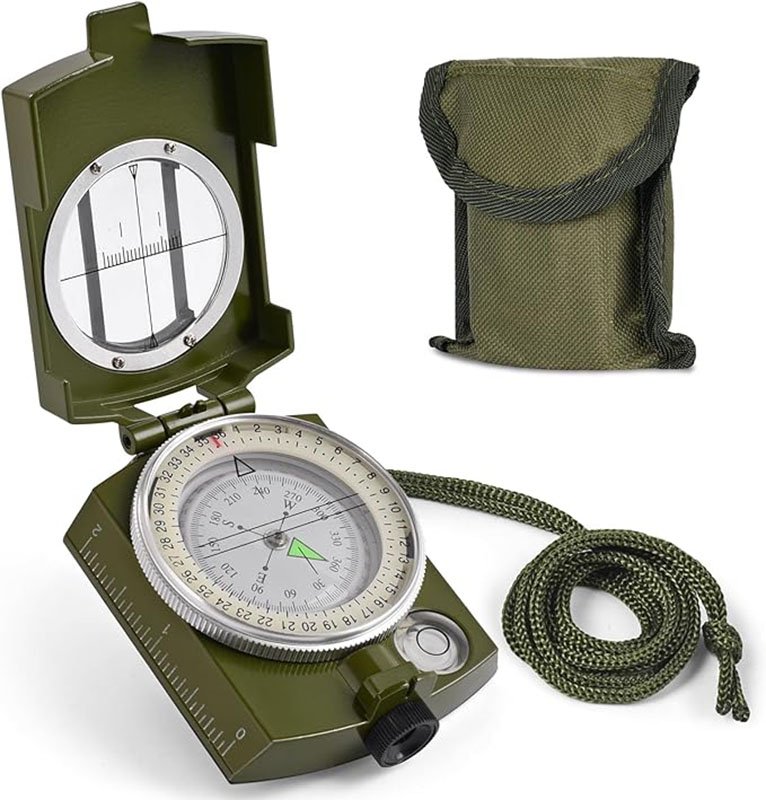Having the right hiking compass can make all the difference when navigating difficult terrain. Whether trekking through rugged mountain trails or exploring dense forests, having a reliable compass is essential for staying on course and not getting lost.
If you’ve ever found yourself stuck, your GPS signal down, your phone dying, and your map soaking wet (or ripped), you’re going to want to get a good compass to add to your outdoor gear.
The best hiking compass is the Suunto MC-2 G Mirror Compass. Made to be used globally, this enhanced compass can get you anywhere. We’ll also explore options for hikers, ranging from the best specialized military compass to the best compass for beginners, to help you find the right one for you.
Whether you’re a seasoned mountaineer or a casual hiker looking for your first navigation tool, there’s a good hiking compass somewhere on our list to suit your needs. So lace up your boots, grab your pack, and let’s dive into the five best hiking compasses for 2024.
Best Compasses for Hiking
The Suunto MC-2 G Mirror Compass is a professional mirror compass that comes with the highest standard of features for precise directional measurements with its global needle. This is an advanced navigation compass that can be used globally for navigation.
It has a fast, globally balanced needle with jewel bearings to improve accuracy and sighting tools for accurate readings. The sighting mirror offers precision navigation even in challenging conditions for sighting bearings and signaling. It also includes a sighting hole and notch for more accurate bearings.
The magnifying lens on the baseplate allows for closer examination of small details on maps, such as contour lines or place names, making it easier to navigate accurately and interpret map features even in low light or when visibility is limited.
It features a declination adjustment to compensate for the difference between magnetic north (the direction indicated by the global needle) and true north (the direction towards the North Pole).
The detachable snap-lock lanyard with wristlock allows for easy detachment, for working with a map and luminescent markings for navigating in lower light conditions.
It includes a clinometer to measure angles of slope or elevation, with a 20-degree tilt margin for easier readings and Metric UTM scales, and an inch ruler for measuring distances and coordinates in different units.
The liquid-filled capsule ensures stable operation, minimizing needle oscillation and providing reliable readings even in turbulent conditions.
Specs:
- Measurements: 2.56 x 3.98 x 0.71 inches
- Weight: 75 grams
- Bezel Material: Plastic
- In the box: compass, lanyard with wristlock and declination correction tool, quick release, Quick Guide

Fast, simple, and accurate, the Suunto A-10 Compass is a baseplate compass that is easy to learn and great as a first compass. It’s best for use in ordinary conditions as a map and compass navigation tool. The A-10 compass is the best starter compass for hikers seeking simplicity and efficiency.
Balanced for use in the northern hemisphere or southern hemisphere, it features inch/cm scales and a fixed declination for easy navigation. Its compact design features a high-grade steel needle with jewel bearings and a liquid-filled capsule, for stability.
The detachable snap-lock lanyard makes it easy to find and use while trekking. Suunto is a trusted mechanical compass company from Finland whose compasses are designed for safe and precise navigation. Crafted from durable materials, they offer fast, stable, and straightforward navigation without batteries.
Specs:
- Measurements: 1.39 x 3.2 x 5.09 inches
- Weight: 31 grams
- Material: Plastic

The Eyeskey Military Sighting Navigation Compass is the best for safety and informed decision-making in challenging terrain. It’s equipped with a built-in clinometer, to measure slope angles, elevations, and avalanche hazards during activities like mountain climbing, backcountry skiing, or steep hiking.
The liquid-filled compass provides reliable and accurate readings. The luminous dial enhances visibility in low-light conditions, with the bonus of the adjustable luminous marching line which can be moved to align your your desired direction. With a thumb hold and magnifying viewer, reading the dial is easy.
Crafted from waterproof rugged aluminum alloy, this military compass is remarkable for its sturdiness and durability. Its rugged construction allows it to withstand extreme outdoor conditions with military-level build quality. It also comes with a pouch and lanyard for safe, easy carrying.
This compass offers extra features like the sighting line to help in aligning distant objects, while the rotating bezel ring allows you to set direction or measuring angles, and the measurement conversion chart enables easy conversion between different units of measurement.
Specs:
- Measurements: 4.02 x 3.27 x 2.13 inches
- Weight: 17 grams
- Material: Aluminum

This small compass is designed for swift and accurate navigation during outdoor activities. For quick map and compass reading, the KanPas Elite Thumb Orienteering Compass offers a luminous display that shines in low-light conditions.
Its robust waterproof housing safeguards the detachable mechanism. With its responsive needle and comfortable thumb grip, this compass ensures reliable performance for those who want to focus on their activity and navigate under time pressure.
The needle is not magnetized so it remains unaffected by external magnetic fields, providing accurate and reliable readings. This is crucial for navigation and orientation, especially in environments where magnetic interference is common, such as near electronic devices or metallic objects.
This thumb compass has bright luminosity so it’s easy to see at night. It has a secure thumb strap and is convertible for use on your left or right hand. The needle response is fast. Plus, it features a durable, waterproof, and shockproof housing, with a stable pointer.
For an on-the-go compass, KanPas Elite Thumb Compass is small, light, and works well. It doesn’t have a sighting mirror and has fewer features than a more complex compass. (Tip: If you’re looking for a more elaborate thumb compass, we recommend the Silva Arc Jet C.)
Specs:
- Measurements: 3 x 2.6 x 0.5 inches
- Weight: 40 grams
- Material: Acrylic

If you’re looking for the best quality compass for the best price, then the COTOUXKER Lensatic Hiking Compass is for you. This compass guarantees precise readings with lensatic function, a prism lens, bubble level, and clear scales that offer improved accuracy and reduce errors.
Crafted from durable materials, it’s built to withstand the rigors of outdoor conditions. Even in low-light or dark environments, its fluorescent design and glow-in-the-dark interface make it easy to navigate, especially if you get stuck without a light.
It comes complete with a carrying case and lanyard for effortless packing on any long expedition. You will need to calibrate the compass from time to time, but it certainly does the job.
Specs:
- Measurements: 4.53 x 3.31 x 1.85 inches
- Weight: 200 grams
- Material: Aluminum
- In the box: lanyard, carrying case/pouch
Buyer’s Guide: How to Pick The Best Compass
Things to Consider When Buying a Compass
It’s important to consider several key factors when buying a compass. First, determine the type of compass that makes sense for the type of hiking you will do, whether it’s a baseplate, lensatic, or wrist compass. Next, prioritize accuracy and look for stable needles and reliable directional readings.
Durability is also crucial, so opt for robust compasses for various conditions. Features such as adjustable declination, sighting mirrors, and luminous markings can enhance usability, especially for beginner users. Additionally, consider the size and weight of the compass.
Magnetic Compass
When it comes to hiking, magnetic compasses are used to detect Earth’s magnetic field to determine compass navigation. The magnetic needle aligns itself with the Earth’s magnetic North and South poles in order to give you information for navigation.
The needle is affixed to a pivot, enabling it to move and point in different directions. When the compass is held steady and away from magnetic disturbances, the needle aligns itself with magnetic North, serving as a fundamental guide to measuring map distances based on your location.
Baseplate Compass
A baseplate compass is a type of compass that typically consists of a transparent plastic baseplate with a compass rose (a circle marked with directions), and a magnetic needle/ orienting arrow mounted on top. These are often used for navigation and orientation during outdoor activities.
This type of compass often includes a bezel marked with rulers, scales, and degrees, for measuring distances on maps and orienting lines for aligning with map grids. By placing the compass flat on a map and then pointing the orienting arrow in the direction you want to go, you can read the bearing directly from the degree scale.
Mirror Compass
A mirror compass integrates a mirror, enabling hikers to see objects in the distance and view the magnetic needle simultaneously. Unlike a baseplate compass, where you need to hold it level and look down, mirror compasses allow you to look straight ahead, for precise aiming and readings.
Military-Style or Lensatic
Military-style (lensatic) compasses, are a kind of compass that helps you find directions more accurately. It has a small magnifying glass and a sighting lens that you can look through to line up with distant objects. This will help you get a precise reading even when it’s hard to see landmarks.
Wrist Compass
A wrist compass is a handy navigation device worn like a watch, it offers users hands-free access to directional guidance. With a compact design, these compares have a compact design with a magnetic needle, degree markings, and a rotating bezel. Some models will have a transparent base for map use.
Thumb compass
A thumb compass is a small navigational device worn on the thumb, often used by orienteers, runners, and adventure racers for frequent on-the-go navigation. It keeps their hands free for terrain navigation. Their small size means they do not have any extra features to accurately measure map distances.
Frequently Asked Questions
Are compasses good for hiking?
Compasses are a reliable means of navigation. In remote areas where GPS signals might be weak or unavailable, compasses allow hikers to determine their direction, orient themselves, and navigate safely to their destination. Compasses are dependable as they do not rely on batteries.
What type of compass is best for hiking?
A baseplate compass is typically considered the best option. They’re lightweight, compact, and easy to use. They typically feature a transparent baseplate with ruler markings for measuring distances on maps and a rotating bezel for aligning with the map’s orientation.
Baseplate compasses have magnetic needles for determining direction. Additionally, baseplate compasses often include features such as adjustable declination, sighting mirrors, and luminous markings for low-light conditions.
Why can’t I just use GPS for navigation?
GPS devices need a power source, so you should always carry a compass with you as a backup, ensuring you stay on track even if technology fails. It enhances your safety by helping you avoid hazardous areas and stay on designated trails.
A GPS device utilizes signals from satellites to determine the user’s precise location, providing features such as mapping, route planning, altitude, elevation tracking, and atmospheric measures for tracking weather. These devices are rugged, durable, and typically have long battery life, but are not foolproof.
What types of compasses are used for hiking?
All of the styles we have discussed here are suitable options for hiking. Baseplate compasses are the most common, featuring transparent baseplates with ruler markings and rotating bezels. Lensatic compasses are rugged and durable, ideal for challenging terrains, and more complex navigation.
Wrist compasses offer hands-free navigation convenience, while thumb compasses are compact and worn on the thumb for frequent navigation updates if you’re doing more extreme outdoor activities.
What is the difference between magnetic north and true north?
Magnetic north is the direction indicated by a magnetic compass needle, aligning with the Earth’s magnetic field. The magnetic pole is not located at the geographic North Pole. It is slightly offset and moves over time due to changes in the Earth’s magnetic field.
True north, on the other hand, refers to the direction toward the geographic North Pole, which is the northern endpoint of the Earth’s rotational axis. True North is used as a reference for navigation and mapping purposes.
The angle between magnetic north and true north is called magnetic declination. This variation in angle depends on the location on the Earth’s surface and changes over time due to fluctuations in the Earth’s magnetic field. Compasses often incorporate adjustments for magnetic declination.
How do I account for declination when using a compass for hiking?
Use a topographic map for your current location or use a declination calculator. It’s typically measured in degrees east or west, indicating the angle between magnetic north and true north. Most compasses allow you to manually adjust for declination.
Locate the declination adjustment screw or dial, and use the declination value and accurate bearing you obtained to make the necessary adjustments. If the declination is east, subtract the declination value from the magnetic bearing. If the declination is west, add the declination value to the magnetic bearing.
Align your map so that true north (grid north) is parallel to the edge of the compass and then take bearings. Use the adjusted compass readings to determine the correct direction of travel relative to true north.
Can I use a compass for hiking in different hemispheres?
Not every compass can be used in different hemispheres, but the Suunto MC-2 G Mirror Compass is a global compass that can be used in all hemispheres.
The Best Compass for Hiking
Selecting the ideal hiking compass can be a daunting task given the options available, but it’s easy once you nail down your specific needs. Consider factors such as what type of compass you want, a thumb compass, mirror compass, military, or baseplate. Think about how durable it needs to be.
Whether you opt for a versatile compass like the Suunto MC-2 G Mirror Compass or a specialized option like the Eyeskey Military Sighting Navigation Compass, with the right compass in hand, you can confidently navigate through any terrain and embark on unforgettable outdoor adventures and spectacular hikes.
For more hiking essentials, check out our picks for Best Hiking Watches.





